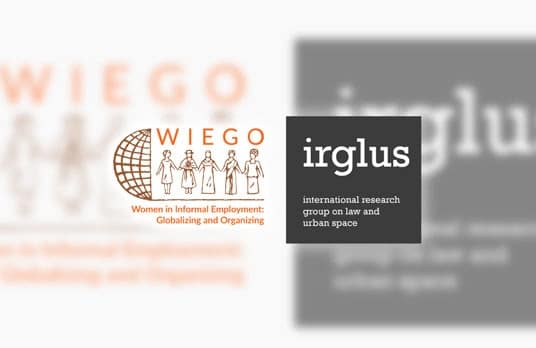Contested Urban Spaces: Urbanisation, Law, and Informal Work
How do informal worker livelihoods interface with urban space, law, and the state in the globalised environment? Contested Urban Spaces: Urbanisation, Law, and Informal Work is a two-year edited book project by WIEGO and IRGLUS that explores this theme across multiple jurisdictions and from diverse viewpoints.
Everyday urban space reveals a contested terrain relied upon by informal workers to sustain their livelihoods despite this access made tenuous through various legal assemblages. These include property rights, planning laws and systems, and the arbitrary enforcement of governance. Informal workers are key enablers in urban growth, but the benefits that arise from urban growth do not necessarily transfer to informal workers. Instead, they remain at the policy and legal margins of urban society, and they remain in a constant struggle towards social and legal protection across a variety of jurisdictional contexts. This marginalisation contributes to jobless urban growth; in this condition, employment remains precarious and largely insecure while nevertheless contributing to urban growth.
But the law is also central in this marginality in the way it tends to construct cities in binaries – as informal or formal, legal or illegal, governable or ungovernable. This binary framework pathologizes the informal economy, seeing it as unruly, chaotic, unproductive and illegal while nevertheless drawing on informal work to further capital gains. As a result, informal workers are often criminalised and run risk of falling foul of the law.
This marginality directly affects informal worker access to everyday urban space. Street vendors, waste pickers, newspaper sellers, musicians, informal transport operators, etc. rely on access to everyday urban space to sustain their livelihoods. This project is interested primarily in how the law mediates this access, and it is from this basis that we invite project participants in submitting their paper proposal to consider these and other questions:
-
What is the role of law in structuring and producing the conditions under which urban informal livelihoods exist? How can the law be used in protecting informal worker access to everyday urban space?
-
How does the systemic design and dominant philosophies of specific disciplines within the law (for example: property law, planning law, administrative law, labour law, etc.) serve to marginalise or protect urban informal worker livelihoods?
-
How do global market forces and relationships between capital and the state play out at local government level, and how does this impact on city-level regulation of informal work?
-
What are the legal assemblages involved that construct and straddle a binary of legal/illegal viz. informal work in the urban and spatial environment?
-
How do law and the state treat/marginalise a plurality of alternative governance systems (for example, informal and indigenous)?
-
What kind of influence do ‘soft law’ and ‘soft policy’ instruments – such as the New Urban Agenda and ILO Recommendation 204 – play in the social and legal protection of informal worker livelihoods in a globalised urban environment?
-
Are urban social movements contributing to the reconstitution of the urban commons and everyday urban space? What lessons do they offer in rethinking paradigms of the law and local governance models?
-
As a component of the law, how have courts and judges responded in substance to cases brought by or against informal workers? What jurisprudential philosophies and judicial assumptions behind everyday urban space and informal livelihoods characterise judicial reasoning in these cases?
To participate in this project, please submit an abstract of between 300-400 words to the editors by no later than 18 June 2021 to contestedurbanspaces@gmail.com. If you have any queries, please feel free to contact either or both the project’s editors: Thomas Coggin (thomas.coggin@wits.ac.za) and Roopa Madhav (roopa.madhav@wiego.org).
Project Partners
WIEGO: Women in Informal Employment: Globalizing and Organizing (WIEGO) is a global network focused on empowering the working poor, especially women, in the informal economy to secure their livelihoods. WIEGO believes that all workers should have equal economic opportunities, rights, protection and voice, and promotes change through: improving statistics and expanding knowledge on the informal economy; building networks and capacity among informal worker organizations; and, jointly with networks and organizations, influencing local, national and international policies.
IRGLUS: The International Research Group on Law & Urban Space (IRGLUS) is a global network of scholars which gathers academics from diverse backgrounds – jurists, geographers, sociologists, political scientists, urban planners, environmentalists – who are interested in the interface between law and urbanisation. Comprising over 200 members, IRGLUS encourages socio-legal research in urban legal studies, and it organises in-person and online gatherings to discuss topical issues in this field.
